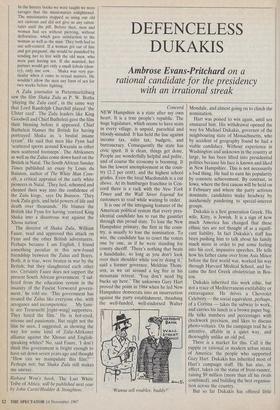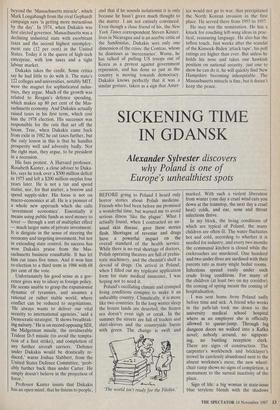DEFENCELESS DUKAKIS
Ambrose Evans-Pritchard on a
rational candidate for the presidency with an irrational streak
Concord NEW Hampshire is a state after my own heart. It is a true people's republic. The huge legislature, which seems to have seats in every village, is unpaid, parochial and bloody-minded. It has held the line against income tax, sales tax, budgets, and bureaucracy. Consequently the state has civic spirit. It is clean, things get done, People are wonderfully helpful and polite, and of course the economy is booming. It has the lowest unemployment in the coun- try (2.2 per cent), and the highest school grades. Even the local Macdonalds is a cut above. At its hamburger franchise in Con- cord there is a rack with the New York Times and the Wall Street Journal for customers to read while waiting to order.
It is one of the intriguing features of the American political system that every pres- idential candidate has to run the gauntlet through this proud state. To lose the New Hampshire primary, the first in the coun- try, is usually to lose the nomination. To win, the candidate has to court the voters one by one, as if he were standing for county sheriff. 'There's nothing that beats a handshake, so long as you don't look over their shoulder while you're doing it,' said a former governor, Meldrim Thom- son, as we sat around a log fire in his mountain retreat. 'You don't need big bucks up here.' The unknown Gary Hart proved the point in 1984 when he led New Hampshire democrats into an insurrection against the party establishment, thrashing the well-funded, well-endorsed Walter 'Wanna sell roubles, buddy?' Mondale, and almost going on to clinch the nomination.
Hart was poised to win again, until sex ensnared him. His withdrawal opened the way for Michael Dukakis, governor of the neighbouring state of Massachusetts, who by accident of geography found he had a viable candidacy. Without experience in Washington and unknown in the country at large, he has been lifted into presidential politics because his face is known and liked in New Hampshire. This is not necessarily a bad thing. He had to earn his popularity by concrete achievement. By contrast, in Iowa, where the first caucus will be held on 8 February and where the party activists dominate, candidates make headway by assiduously pandering to special-interest groups.
Dukakis is a first generation Greek. His wife, Kitty, is Jewish. It is a sign of how much America has changed that these ethnic ties are not thought of as a signifi- cant liability. In fact Dukakis's staff has been pushing him to talk about his family much more in order to put some feeling into his cool, impassive speeches. He tells how his father came over from Asia Minor before the first world war, worked his way through Harvard Medical School, and be- came the first Greek obstetrician in Bos- ton.
Dukakis inherited this work ethic, but not a trace of Mediterranean excitability or extravagance. He drives a Chevrolet Celebrity — the social equivalent, perhaps, of a Cortina — takes the subway to work, and carries his lunch in a brown paper bag. He talks numbers and percentages with clockwork precision, and likes to discuss photo-voltaics. On the campaign trail he is attentive, affable in a quiet way, and thoroughly unlike an old pol.
There is a market for this. Call it the yuppie or rational or modern urban strata of America: the people who supported Gary Hart. Dukakis has inherited most of Hart's campaign staff. He has also, in effect, taken on the status of front-runner, raising $9 million (more than all his rivals combined), and building the best organisa- tion across the country.
But so far Dukakis has offered little beyond the 'Massachusetts miracle', which Mark Longabaugh from the rival Gephardt campaign says 'is getting more miraculous by the day'. In 1974, when Dukakis was first elected governor, Massachusetts was a declining industrial state with exorbitant taxes and the second highest unemploy- ment rate (12 per cent) in the United States. Today it is the queen of high-tech enterprise, with low taxes and a tight labour market.
Dukakis takes the credit. Some critics say he had little to do with it. The state's 122 colleges and universities, notably MIT, were the magnet for sophisticated indus- tries, they argue. Much of the growth was related to Reagan's defence spending, which makes up 80 per cent of the Mas- sachusetts economy. And Dukakis actually raised taxes in his first term, which cost him the 1978 election. His successor was responsible for the cuts that set off the boom. True, when Dukakis came back from exile in 1982 he cut taxes further, but the only lesson in this is that he handles prosperity well and adversity badly. Not the right man, they argue, to be president in a recession.
His fans protest. A Harvard professor, Rosabeth Kanter, a close adviser to Duka- kis, says he took over a $500 million deficit in 1975 and Ieft a $200 million surplus four years later. He is not a tax and spend statist, nor, for that matter, a borrow and spend supply-sider. His focus is not on macro-economics at all. He is a pioneer of a whole new approach which she calls `investment economics'. Essentially it means using public funds as seed money to lever — through a sort of multiplier effect — much larger sums of private investment. It is dirigiste in the sense of steering the economy and targeting investment, but not in extending state control. Its success has won Dukakis praise from the Mas- sachusetts business roundtable. It has let him cut taxes five times. And it won him re-election to a third term in 1986 with 68 per cent of the vote.
Unfortunately his good sense as a gov- ernor gives way to idiocy in foreign policy. He seems unable to grasp the expansionist dynamic of tyrannies, and assumes a rational or rather stable world, where conflict can be reduced to negotiations. 'He always wants to deliver our vital security to international agencies,' said a Democratic strategist. 'It shows breathtak- ing naivety.' He is on record opposing SDI, the Midgetman missile, the invulnerable Trident D-5 missile (to avoid the tempta- tion of a first strike), and completion of any further aircraft carriers. 'Defence under Dukakis would be drastically re- duced,' warns Joshua Slabbert, from the United States Defence Committee, 'prob- ably further back than under Carter. He simply doesn't believe in the projection of force.'
Professor Kanter insists that Dukakis has an open mind, that he listens to people, and that if he sounds isolationist it is only because he hasn't given much thought to the matter. I am not entirely convinced. Even though a close friend of his, the New York Times correspondent Steven Kinzer, lives in Nicaragua and is an acerbic critic of the Sandinistas, Dukakis sees only one dimension of the crisis: the Contras, whom he dismisses as 'mercenaries'. Worse, he has talked of pulling US troops out of Korea as a protest against government repression, and has done so just as the country is moving towards democracy. Dukakis knows perfectly that it was a similar gesture, taken as a sign that Amer- ica would not go to war, that precipitated the North Korean invasion in the first place. He served there from 1955 to 1957.
He may win the nomination. He has a knack for couching left-wing ideas in prac- tical, reassuring language. He also has the teflon touch. Just weeks after the scandal of the Kinnock-Biden 'attack tape', his poll ratings are higher than ever. But unless he holds his nose and takes one hawkish position on national security, just one to show he can do it, he will quickly find New Hampshire becoming inhospitable. The Massachusetts miracle is fine, but it doesn't keep the peace.











































































 Previous page
Previous page